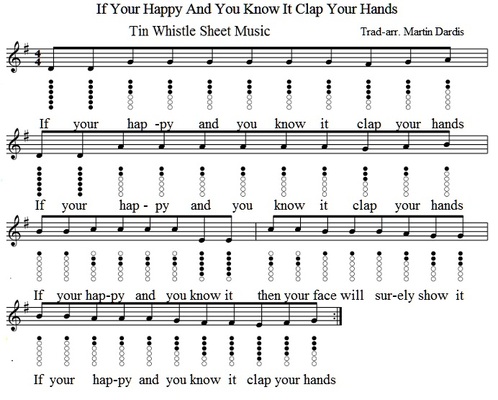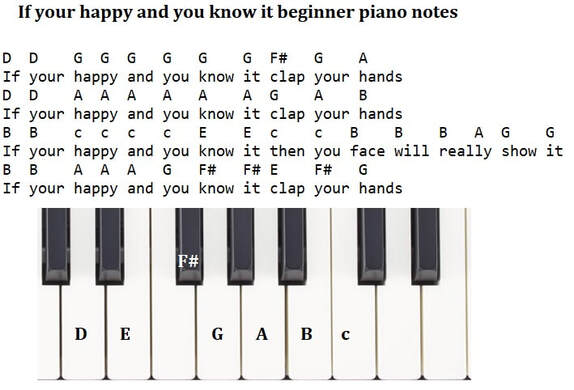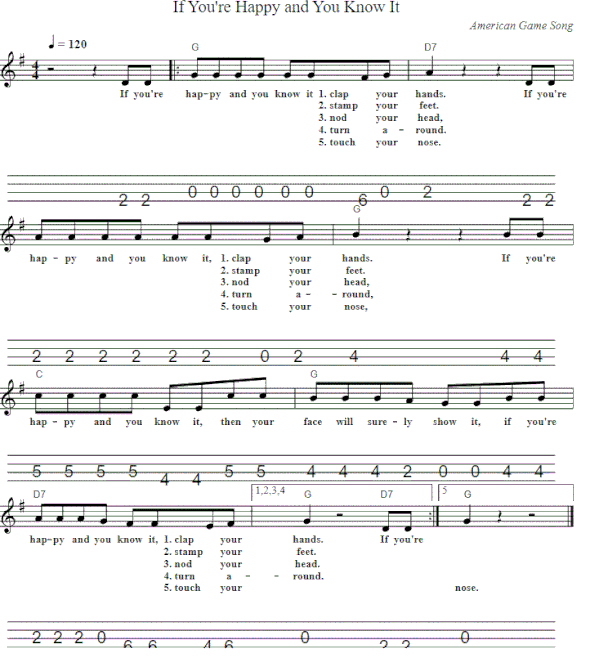If Your Happy And You Know It Clap Your Hands tin whistle sheet music
This is another easy song to play. I have added a youtube video to help you to learn how to play the song. Return to the kids tin whistle song list .If your happy and you know it clap your hands easy beginner piano notes now included along with the tenor guitar / mandola tab in CGDA.
The statement “If you’re happy and you know it, clap your hands” is a popular children’s song and a well-known phrase that has been ingrained in our minds from a young age. Though it may seem like a simple and playful tune, the concept behind it holds a deeper meaning and has been a topic of discussion and research in various fields such as psychology, neuroscience, and sociology. Happiness is a universal human emotion that has intrigued philosophers, scientists, and laypeople for centuries, and the act of clapping hands as a physical expression of happiness holds significant implications for our understanding of wellbeing and human behavior.
The concept of happiness has been a subject of interest for philosophers since ancient times. Aristotle, often referred to as the father of happiness, believed that the ultimate goal of human life is to achieve eudaimonia, or a state of enduring happiness and wellbeing. Similarly, in the 18th century, the philosopher Immanuel Kant argued that happiness is the ultimate purpose of human existence. However, the understanding of happiness has evolved over time, with modern psychologists defining it as a positive emotional state that is closely related to life satisfaction, fulfillment, and overall wellbeing.
In recent years, there has been a surge of research in the field of positive psychology, which focuses on the study of human happiness and wellbeing. Studies have shown that happiness is not just a fleeting emotion but a state of being that can be cultivated and sustained through various factors such as genetics, life circumstances, and personal choices. One such study by Sonja Lyubomirsky, a professor of psychology at the University of California, found that only 10% of our happiness is determined by external factors, while the remaining 90% is influenced by our internal disposition and intentional activities.
Here, the phrase “if you’re happy and you know it” takes on a new meaning. It suggests that happiness is not just a passive state but an active one that requires self-awareness and recognition. Research has shown that individuals who are aware of their emotions and have the ability to regulate them are more likely to experience higher levels of happiness and wellbeing. This is where the act of clapping hands comes into play. Clapping hands is a physical expression of happiness, and by doing so, we are actively acknowledging and celebrating our positive emotions.
Furthermore, the act of clapping hands has been linked to the release of endorphins, also known as the “feel-good” hormones. When we clap our hands, the nerve endings in our palms are stimulated, which sends signals to our brain to release endorphins, resulting in a feeling of pleasure and happiness. This biological response to clapping hands can be observed in children as young as 2 years old, who instinctively clap their hands when they are happy or excited.
In addition to its psychological and biological effects, the act of clapping hands also has social and cultural significance. It is a universal gesture that is used in various cultures and contexts to express joy, appreciation, and celebration. From applauding a performance to congratulating someone, clapping hands has become a social norm for expressing positive emotions. This is evident in the increasing trend of “clapping emojis” in digital communication, where individuals use them to convey happiness and support.
However, the phrase “clap your hands” also raises questions about the relationship between happiness and external validation. In today’s society, where social media and external validation play a significant role in shaping our perceptions of happiness, the act of clapping hands can be seen as seeking approval and validation from others. This highlights the complex nature of happiness and how it can be influenced by external factors.
In conclusion, the phrase “if you’re happy and you know it, clap your hands” holds a multifaceted meaning and has significant implications for our understanding of happiness and human behavior. It highlights the active and intentional nature of happiness and the role of self-awareness in its cultivation. The physical act of clapping hands not only expresses happiness but also has psychological and biological effects. It also reflects the social and cultural significance of this universal gesture. However, it also raises questions about the impact of external validation on our happiness. Ultimately, this phrase serves as a reminder to actively recognize and celebrate our positive emotions, and that true happiness comes from within.
The concept of happiness has been a subject of interest for philosophers since ancient times. Aristotle, often referred to as the father of happiness, believed that the ultimate goal of human life is to achieve eudaimonia, or a state of enduring happiness and wellbeing. Similarly, in the 18th century, the philosopher Immanuel Kant argued that happiness is the ultimate purpose of human existence. However, the understanding of happiness has evolved over time, with modern psychologists defining it as a positive emotional state that is closely related to life satisfaction, fulfillment, and overall wellbeing.
In recent years, there has been a surge of research in the field of positive psychology, which focuses on the study of human happiness and wellbeing. Studies have shown that happiness is not just a fleeting emotion but a state of being that can be cultivated and sustained through various factors such as genetics, life circumstances, and personal choices. One such study by Sonja Lyubomirsky, a professor of psychology at the University of California, found that only 10% of our happiness is determined by external factors, while the remaining 90% is influenced by our internal disposition and intentional activities.
Here, the phrase “if you’re happy and you know it” takes on a new meaning. It suggests that happiness is not just a passive state but an active one that requires self-awareness and recognition. Research has shown that individuals who are aware of their emotions and have the ability to regulate them are more likely to experience higher levels of happiness and wellbeing. This is where the act of clapping hands comes into play. Clapping hands is a physical expression of happiness, and by doing so, we are actively acknowledging and celebrating our positive emotions.
Furthermore, the act of clapping hands has been linked to the release of endorphins, also known as the “feel-good” hormones. When we clap our hands, the nerve endings in our palms are stimulated, which sends signals to our brain to release endorphins, resulting in a feeling of pleasure and happiness. This biological response to clapping hands can be observed in children as young as 2 years old, who instinctively clap their hands when they are happy or excited.
In addition to its psychological and biological effects, the act of clapping hands also has social and cultural significance. It is a universal gesture that is used in various cultures and contexts to express joy, appreciation, and celebration. From applauding a performance to congratulating someone, clapping hands has become a social norm for expressing positive emotions. This is evident in the increasing trend of “clapping emojis” in digital communication, where individuals use them to convey happiness and support.
However, the phrase “clap your hands” also raises questions about the relationship between happiness and external validation. In today’s society, where social media and external validation play a significant role in shaping our perceptions of happiness, the act of clapping hands can be seen as seeking approval and validation from others. This highlights the complex nature of happiness and how it can be influenced by external factors.
In conclusion, the phrase “if you’re happy and you know it, clap your hands” holds a multifaceted meaning and has significant implications for our understanding of happiness and human behavior. It highlights the active and intentional nature of happiness and the role of self-awareness in its cultivation. The physical act of clapping hands not only expresses happiness but also has psychological and biological effects. It also reflects the social and cultural significance of this universal gesture. However, it also raises questions about the impact of external validation on our happiness. Ultimately, this phrase serves as a reminder to actively recognize and celebrate our positive emotions, and that true happiness comes from within.
If your happy and you know it clap your hands easy beginner piano notes
Below is the tenor guitar / banjo / mandola tab in CGDA Tuning
Below is the list of sheet music and tin whistle songs that are in my ebooks. This is the largest collection of tin whistle songs ever put together.[over 800 songs ] Including folk, pop and trad tunes plus German And French songs along with Christmas Carols.
All of the sheet music tabs have been made as easy to play as was possible.
The price of the ebooks is €7.50
All of the sheet music tabs have been made as easy to play as was possible.
The price of the ebooks is €7.50



